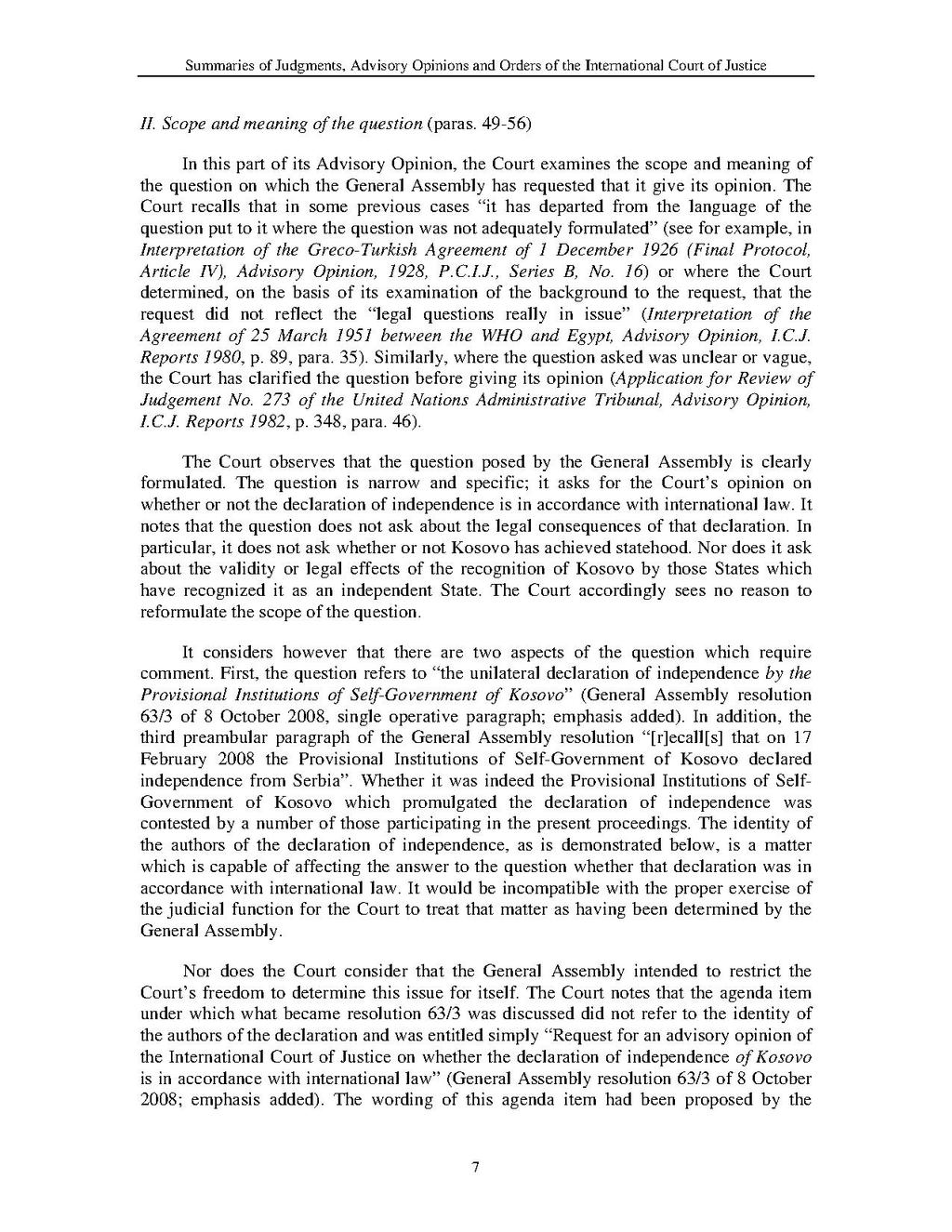Summaries of Judgments, Advisory Opinions and Orders of the International Court of Justice
II. Scope and meaning of the question (paras. 49-56)
In this part of its Advisory Opinion, the Court examines the scope and meaning of the question on which the General Assembly has requested that it give its opinion. The Court recalls that in some previous cases "it has departed from the language of the question put to it where the question was not adequately formulated" (see for example, in Interpretation of the Greco-Turkish Agreement of 1 December 1926 (Final Protocol, Article IV), Advisory Opinion, 1928, P.C.I.J., Series B, No. 16) or where the Court determined, on the basis of its examination of the background to the request, that the request did not reflect the "legal questions really in issue" (Interpretation of the Agreement of 25 March 1951 between the WHO and Egypt, Advisory Opinion, I.C.J. Reports 1980, p. 89, para. 35). Similarly, where the question asked was unclear or vague, the Court has clarified the question before giving its opinion (Application for Review of Judgement No. 273 of the United Nations Administrative Tribunal, Advisory Opinion, I.C.J. Reports 1982, p. 348, para. 46).
The Court observes that the question posed by the General Assembly is clearly formulated. The question is narrow and specific; it asks for the Court's opinion on whether or not the declaration of independence is in accordance with international law. It notes that the question does not ask about the legal consequences of that declaration. In particular, it does not ask whether or not Kosovo has achieved statehood. Nor does it ask about the validity or legal effects of the recognition of Kosovo by those States which have recognized it as an independent State. The Court accordingly sees no reason to reformulate the scope of the question.
It considers however that there are two aspects of the question which require comment. First, the question refers to "the unilateral declaration of independence by the Provisional Institutions of Self-Government of Kosovo" (General Assembly resolution 63/3 of 8 October 2008, single operative paragraph; emphasis added). In addition, the third preambular paragraph of the General Assembly resolution "[r]ecall[s] that on 17 February 2008 the Provisional Institutions of Self-Government of Kosovo declared independence from Serbia". Whether it was indeed the Provisional Institutions of Self Government of Kosovo which promulgated the declaration of independence was contested by a number of those participating in the present proceedings. The identity of the authors of the declaration of independence, as is demonstrated below, is a matter which is capable of affecting the answer to the question whether that declaration was in accordance with international law. It would be incompatible with the proper exercise of the judicial function for the Court to treat that matter as having been determined by the General Assembly.
Nor does the Court consider that the General Assembly intended to restrict the Court's freedom to determine this issue for itself. The Court notes that the agenda item under which what became resolution 63/3 was discussed did not refer to the identity of the authors of the declaration and was entitled simply "Request for an advisory opinion of the International Court of Justice on whether the declaration of independence of Kosovo is in accordance with international law" (General Assembly resolution 63/3 of 8 October 2008; emphasis added). The wording of this agenda item had been proposed by the
7
